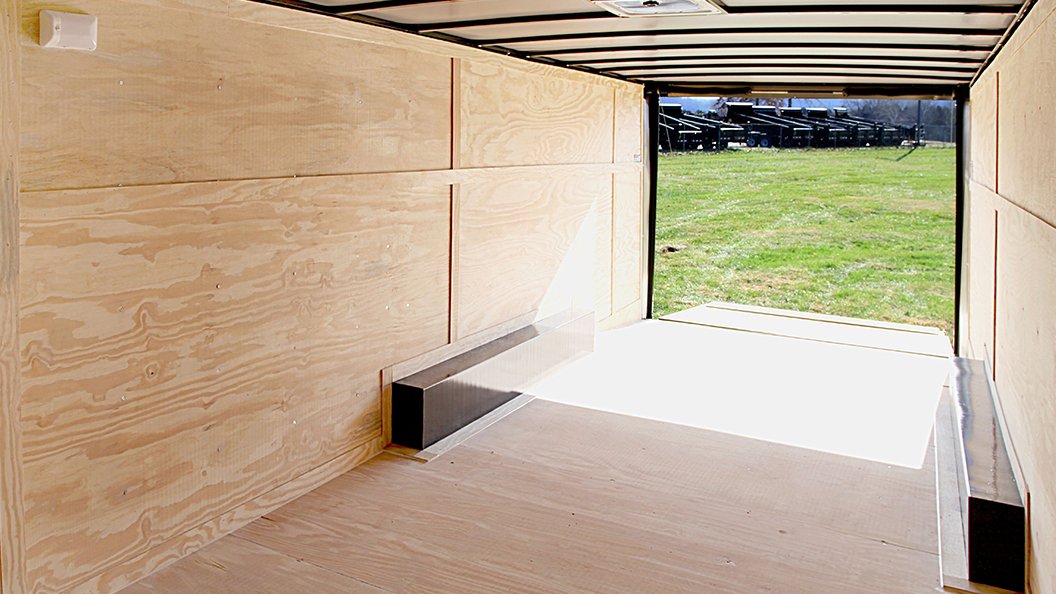How Thick Should Plywood Walls Be in Your Tool Trailer?
October 20, 2021

If you're building a tool trailer with plywood shelves, you need the walls to be thick enough to handle your attachments.
How thick should you make them?
Let's find out.
First, if you're having a trailer built that you plan to upfit into a tool trailer, know this:
You can ask for a custom plywood thickness.
If you're buying a pre-built trailer off a lot, you can't do this, but you have lots of flexibility in how your trailer is built when ordering a custom build.
The Common Plywood Thicknesses
1/4", 3/8", 1/2", 5/8", and 3/4" plywood are the most common interior wall thicknesses for an enclosed tool trailer. These are nominal sizes, so you may find that your trailer actually has 19/32" walls instead of a true 5/8". No biggie.
What Thick Plywood Does
Easy Shelf Attachment
Thick plywood makes it easy to attach plywood shelves, racks, and tools. This is the most obvious reason to use thicker plywood in your tool trailer.
1/2" or 5/8" is sufficient for almost everyone, but some construction trailers will use 3/4".
Some tool trailer builders remove thin plywood from a "new" trailer and replace it with thicker plywood.
This is also a good opportunity to add insulation if your work style requires it.
More Stiffness
Having a little extra stiffness in your trailer isn't always a bad thing.
Some trailers on the cheaper end may use fewer wall studs, fewer fasteners, or some construction method that, well, enables them to be cheap. A consequence of this can be flexing and bad door fitment.
This can lead to water leaks, screw pops, and general annoying-ness.
If you drag your trailer over a lot of rough ground and dirt roads, you might want the extra stiffness from thicker plywood.
More Weight
Weight is the biggest negative to going with thicker plywood.
Many tradespeople ignore weight when building a tool trailer, but it's quite easy to be dragging nearly 7000 lbs of trailer, plywood, tools, and inventory in a typical construction trailer.
Let's take a look at a 7'x16' trailer and figure out the weight differences between different plywood.
First, here are some typical plywood weights that you can use to figure out your own tool trailer build:
| 1/4″ | 1/2″ | 5/8″ | 3/4″ | |
|---|---|---|---|---|
| Softwood plywood | 22.0 lbs | 40.6 lbs | 48.0 lbs | 60.8 lbs |
| Hardwood plywood | 24.4 lbs | 45.1 lbs | 53.3 lbs | 67.5 lbs |
| Baltic Birch | 26.0 lbs | 47.9 lbs | 56.6 lbs | 71.7 lbs |
Below is a table of how much your two side walls and single front wall will weigh if skinned with various thicknesses of plywood.
| 1/4″ | 1/2″ | 5/8″ | 3/4″ | |
|---|---|---|---|---|
| Softwood plywood | 188 lbs | 346 lbs | 410 lbs | 519 lbs |
| Hardwood plywood | 208 lbs | 385 lbs | 455 lbs | 576 lbs |
If you're weight-sensitive in your build, consider using a lighter plywood.
Smaller trailers will especially benefit from this if you want to have lots of tools and organization, want to be mindful of the trailer's GVWR.
Note that 1/2" softwood plywood walls weigh 230 lbs. less than 3/4" plywood walls!
Get work trucks and tips in your mailbox.
Your time is precious. We write about organization, tools, and techniques that make tradespeople work faster and more efficiently. Subscribe to get our articles and tips in your inbox.
We will not spam you.